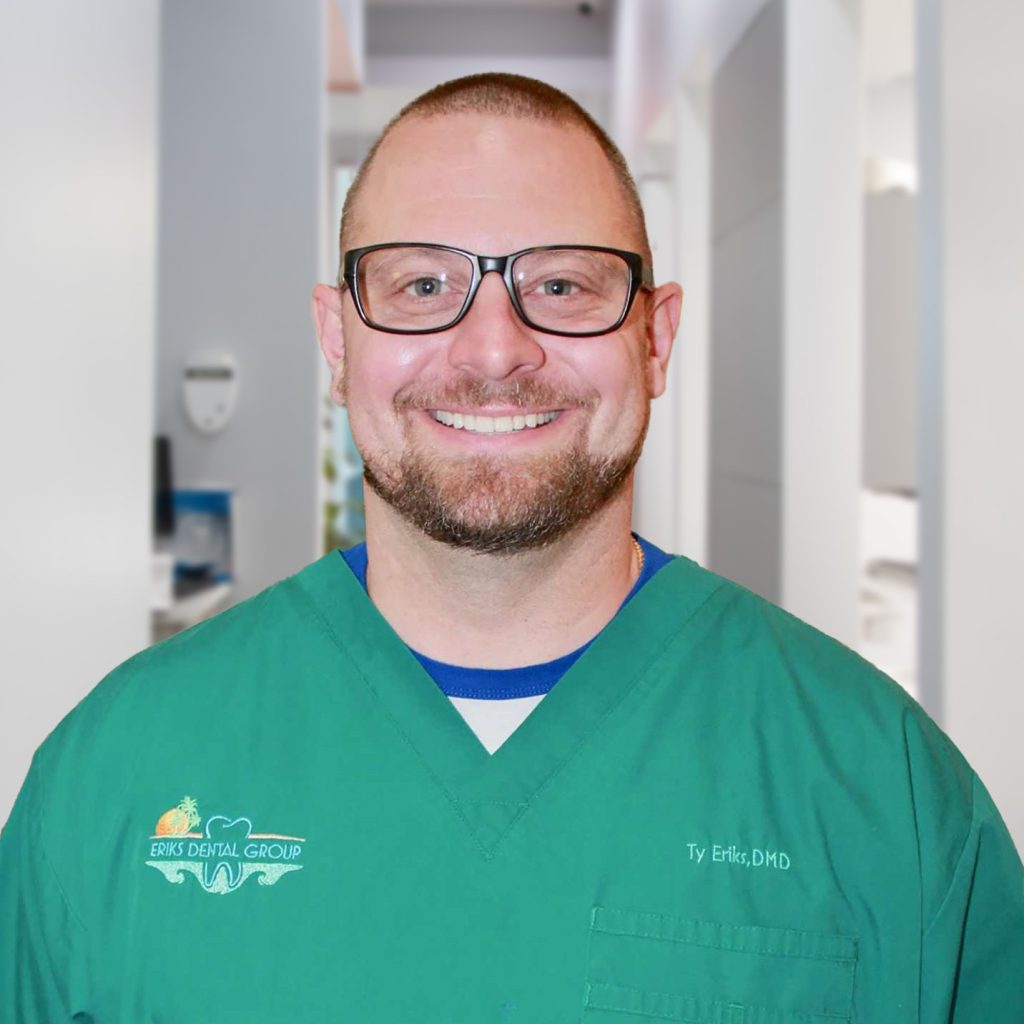Restore Your Smile with Confidence
Eriks Dental Group is a unique dental practice helping patients use their medical insurance to pay for their dental implants. Regain your smile and your life! To learn more, call (561) 733-4004 or complete the form below – our patient support team will follow-up with you.
Accepted Insurances
















Dental Implants

Dental implants have truly revolutionized dentistry over the past twenty years. The best way to picture a dental implant is to imagine a titanium screw, which is essentially screwed into your jaw bone. Then, bone grows around the implant, holding it firmly in place. The titanium screw can then be used in two different ways:
Replace missing teeth: If you are missing one tooth or several teeth, dental implants can be used to replace them. After the implant screw is placed into the jaw bone, a crown can be placed on top of the implant screw that looks and feels like your other teeth. Even if you are missing numerous teeth, many dental implants can be placed to replace the missing teeth. Even if you are missing all your teeth, dental implants can often be used to replace them all.
Hold in a denture or partial denture: If you have a denture or partial denture, dental implants can be used to secure it in place while you chew and speak. If your denture is loose or you use denture adhesive, dental implants can truly change your life. First, the implant screw is placed into your jaw bone. Then, a ball is placed on top of the screw. This ball fits perfectly into a corresponding socket on the inside of your denture or partial denture. The denture or partial denture will snap into place, with the ball-and-socket firmly holding it in. Creating dentures and partial dentures that stay in perfectly while eating and speaking is the hardest task of any dentist. However, dental implants have drastically changed this. If you need a denture or partial denture, you should highly consider using dental implants to hold it in. Also, if you currently have a loose denture or partial denture, they can often be adjusted to snap into dental implants.
Am I a Candidate For an Implant?
Research has shown dental implants have close to a 95% success rate. However, does this mean every patient is a good candidate for a dental implant?
Most people with dental implants say the procedure is similar to a dental extraction. Thus, if you are healthy enough for a tooth to be extracted, you are generally healthy enough for a dental implant.
- The best patients for dental implants are healthy individuals that regularly visit the dentist and have good oral hygiene.
- Certain factors may reduce the success rate of dental implants and need to be evaluated on a case-by-case basis. If any of the following pertain to you, please inform your dentist to help decide whether or not dental implants are your best option: had radiation to the head or neck, take a blood thinner, smoke cigarettes, take medications for osteoporosis, have diabetes, or have any other chronic diseases.
If you are wondering if you are a good candidate, you should schedule an appointment with Dr. Eriks to be evaluated.
What Happens During The Procedure?
Before a dental implant procedure, a thorough examination by a dentist is needed. Together, you and the dentist will determine the correct plan of action to restore your dental health. If a dental implant is the correct option for you, an appointment will be made for the implant placement.
Before the procedure beings, all the risks and benefits of dental implants will be discussed and all of your questions will be answered.
Most people with dental implants say the procedure is similar to a dental extraction. First, the area will be numbed to ensure your comfort throughout the surgery. Then, in that area, your gum tissue will be opened to have access to bone. A perfectly shaped hole will be made in your jawbone that corresponds exactly with the size and dimensions of the titanium implant screw. Then, the implant screw will be placed in the bone. At the end of the procedure, sutures will be used to secure the gum tissue in place. One or two weeks later, you will return for a follow-up appointment, where the sutures will be removed.
The next step of a dental implant is to allow time for your bone to grow around the implant. On average, four to six months are needed for the implant to fully integrate into your jaw bone. After the waiting period, you will return to your dentist. At this point in time, depending on the purpose of the implant, a crown can be placed on top of the implant screw to replace a missing tooth or the screw can be used to hold in your denture or partial denture.
How Much Pain Is Associated?
None. The procedure begins with your dentist making sure that you are numb in the area. A caring periodontist and the highest quality numbing agents will ensure your comfort throughout the entire surgery. Following the dental implant procedure, you may feel discomfort for two to three days. Thus, at the end of the procedure, your dentist will discuss which pain medication to take if needed.
How Long Is The Healing Process?
After the dental implant surgery is completed, detailed instructions will be provided and explained to you on how to care for the area in the coming days. Here are some general instructions:
Since the area will be numb right after completing the surgery, you should not eat until the numbing agent wears off. The length of time depends on the person, but two hours is the average.
You may feel mild to moderate discomfort for a few days after, so you will be instructed at the end of the appointment on which pain medication to take if needed.
In order to prevent an infection, an antibiotic is typically prescribed.
After the first 24 hours, warm salt-water rinses are helpful, around four times a day.
You should mix a teaspoon of salt (regular table salt) in a glass of water (around 9 oz.). Swish for around 1 minute and then spit.
Problems after the surgery occasionally occur. People may swell, develop an infection, bruise, develop a fever, or bleed after the procedure. If this happens to you or if anything is bothering you after any surgery in our office, please contact us immediately. We know this is a difficult period for you, so please do not hesitate to call with any questions or concerns (561) 733-4004.
What If My Crown Needs Repair?
Although crowns are built to last a long time, a problem may develop. If a dental crown happens to chip, break, or falls off, you should see your dentist without delay. At this appointment, many factors will be considered to determine how to treat the problem. If the crown is slightly chipped, a minor repair is typically possible. If the damage is substantial, the tooth crown may need to be remade.
What if your crown fell off and you are unable to immediately visit your dentist?
As a temporary solution, you can visit your local pharmacy and purchase dental cement. Clean the inside of the crown and follow the directions printed on the product. In some products, the cement needs to be mixed, while other cements are activated upon opening. I would like to emphasize that you should dry the tooth as much as possible before using the store-bought dental cement. The longevity of the dental glue drastically increases if the area is dry. You should try to clean up any excess cement around the tooth after the cement hardens. Even if you do re-cement the crown yourself, you still should contact your dentist quickly to schedule an evaluation.
Will I Experience Any Aches or Pains?
Pain from a dental crown should not be taken lightly. Toothaches can begin as a mild discomfort and progress rather quickly and severely. Thus, immediate dental care is highly recommended.
What causes a toothache in a tooth that has a dental crown?
Well, there is a hollow space in the middle of each tooth that holds the tooth’s nerve. A toothache typically stems from the tooth’s nerve becoming inflamed. The nerve can become inflamed from many different causes: a large cavity that developed underneath the crown, a fracture in the tooth, too much biting force on the tooth, or a traumatic blow. The pain can present in a wide range of forms, from sporadic discomfort to lingering severe pain. Also, the pain can have various triggers: cold water, hot water, chewing, or speaking.
What can relieve the discomfort? Every situation is different, but these are possible treatments:
Reduce the biting force on the tooth crown: In some situations, a toothache may be due to excessive force on a tooth during chewing. Your dentist may adjust your bite and slightly reduce the crown’s height. As a result, the biting force would be reduced on that tooth and dispersed evenly throughout the mouth.
Root canal: If the tooth’s nerve is inflamed and causing pain, a root canal is sometimes needed. During a root canal procedure, the nerve of the tooth is removed and the internal space holding the nerve is disinfected and filled with a biocompatible dental material.
Dental extraction: In some situations, the tooth may be severely broken down or fractured, and the tooth may not be able to be saved. In this case, the tooth may need to be extracted, and your dentist would discuss the options to replace the tooth (like a dental implant or bridge).
What else mimics a toothache?
Actually, some people experience symptoms that closely resemble a toothache but stem from other sources, like a sinus infection. In this situation, your dentist will discuss your medical history and take an x-ray to check if a sinus infection is present.
What is the first step of emergency dental care for a toothache?
An x-ray and an evaluation by a dentist are needed to form a definitive diagnosis and discuss treatment options.
Testimonials

